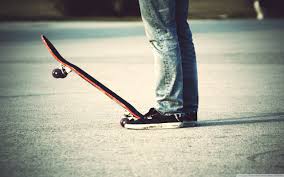skate
英 [skeɪt]
美 [sket]
- vi. 滑冰;滑过
- n. 溜冰;冰鞋
- n. (Skate)人名;(瑞典、英)斯卡特
CET4 考 研 CET6
skate 溜冰,滑冰来自荷兰语 schaats,溜冰,滑冰,可能借自古英语 sceacan,摇摆,滑动,词源同 shake.
- skate
- skate: English has two words skate. The older is the fish-name [14], which was borrowed from Old Norse skata. Skate used for gliding over ice [17] comes from an Old French word for ‘stilt’ – eschasse. Its northern dialect form was escase. This was borrowed into English in the 16th century as the now obsolete scatch ‘stilt’, and into Middle Dutch as schaetse, its meaning unaccountably changed to ‘skate’.
Its modern Dutch descendant schaats was borrowed into English as scates, which soon came to be regarded as a plural, and was ‘singularized’ to skate. Eschasse itself came from a Frankish *skakkja, a derivative of the verb *skakan ‘run fast’, which in turn was descended from prehistoric Germanic *skakan (source of English shake).
=> shake - skate (n.1)
- "type of flat, cartilaginous fish, a kind of ray," mid-14c., from a Scandinavian source such as Old Norse skata "skate," Danish skade, Faeroese skøta, of unknown origin.
- skate (n.2)
- "ice skate," 1660s, skeates "ice skates," from Dutch schaats (plural schaatsen), a singular mistaken in English for plural, from Middle Dutch schaetse. The word and the custom were brought to England after the Restoration by exiled followers of Charles II who had taken refuge in Holland.
The Dutch word is from Old North French escache "a stilt, trestle," related to Old French eschace "stilt" (French échasse), from Frankish *skakkja "stilt" or a similar Germanic source (compare Frisian skatja "stilt"), perhaps literally "thing that shakes or moves fast" and related to root of Old English sceacan "to vibrate" (see shake (v.)). Or perhaps [Klein] the Dutch word is connected to Middle Low German schenke, Old English scanca "leg" (see shank). Sense alteration in Dutch from "stilt" to "skate" is not clearly traced. Sense in English extended to roller-skates by 1876. Meaning "an act of skating" is from 1853. - skate (v.)
- 1690s, "to ice-skate," from skate (n.2). U.S. slang sense of "to get away with something" is attested from 1945. Related: Skated; skating. A modern Latinate word for an ice-skating rink is glaciarium (1876).
- 1. Scientists have tended to skate over the difficulties of explaining dreams.
- 科学家们往往回避释梦的难题。
来自柯林斯例句
- 2. The children wanted the lake to freeze over so they could ice - skate.
- 孩子们希望湖面结冰,这样他们就可以在上面滑冰了.
来自《简明英汉词典》
- 3. They were picked to skate against the visiting team.
- 他们被选出来与客队比赛溜冰.
来自《现代汉英综合大词典》
- 4. It took him only three days to learn to skate.
- 他三天功夫就学会了滑冰.
来自《现代汉英综合大词典》
- 5. He taught her how to skate.
- 他教她怎样滑冰.
来自《现代英汉综合大词典》
[ skate 造句 ]
